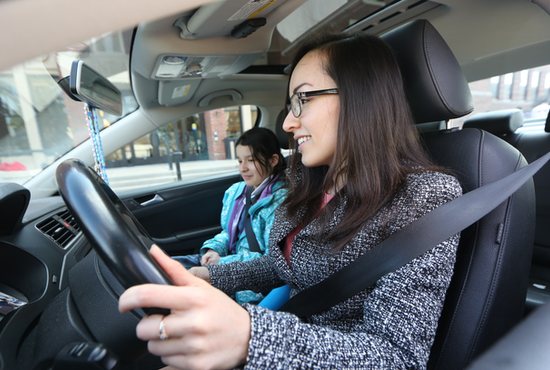
Alejandra Chavez Rivas, 29, knows the ups and downs of immigration rules.
Safely under the Deferred Action for Childhood Arrivals program instituted through executive order by then-President Barack Obama in 2012, Rivas was studying at the University of St. Thomas in St. Paul when President Donald Trump announced plans in the fall of 2017 to phase out the DACA program.
Rivas, who came to the United States from Mexico with her undocumented mother and two brothers when she was 5 years old, found she was unable to renew her DACA protection from deportation, which had been granted every two years. Nor could she renew her driver’s license, which required proof of legal residency. She lost the part-time jobs she had held, because they required proper paperwork.
A single mother living with her parents in Monticello (her father joined the family later) and commuting to school while taking her daughter to St. Agnes School in St. Paul, Rivas also had to worry about being pulled over for any minor driving infraction and possibly deported, or whether she should avoid driving altogether.
“I always said a prayer for the Lord to guard my front, my back, my sides,” she said.
She spent about half her time in friend’s homes or hotels in St. Paul, to cut down on driving and the risk of an accident.
Legal limbo ended after about six months for Rivas as litigation in several courts put Trump’s phase-out order on hold. With her DACA status now renewed until October 2020, she is able to breathe easier when going to work, running errands and taking her 9-year-old daughter, Daniela, to school.
Rivas graduated from St. Thomas last May with bachelor’s degrees in Catholic Studies and business. She works in the property and casualty department of an insurance company in downtown Minneapolis. A regular church-goer at St. Henry in Montecillo and St. Stephen in south Minneapolis, she relies on her faith in all things.
But uncertainty still hangs like a cloud, she said, because of the way U.S. rules on immigration can change. She said she already feels apprehensive about her next DACA renewal.
“Hopefully, it will renew,” she said.
Rivas said she also hopes Minnesota lawmakers pass a bill this legislative session that would allow undocumented immigrants to apply for driver’s licenses. Having that ability would have relieved some of her DACA-related tension, she said. And it would allow her parents to apply for licenses, she said.
Father Joseph Williams, pastor of St. Stephen and the archdiocese’s vicar for Latino Ministry, said up to 90 percent of his congregation is Latino, and half of the adults are undocumented.
“I would say the greatest fear is driving” without a license, Father Williams said. “Of all the immigration issues none touches their lives as directly as not having a driver’s license.”
And the cloud hanging over undocumented immigrants has darkened in recent years, he said, in part because the bar for infractions that can lead to deportation has been lowered.
“More minor infractions can mean you’re in the back of a squad car,” Father Williams said. “And being sent to a detention center almost invariably means you’ll be deported.”
Related:




